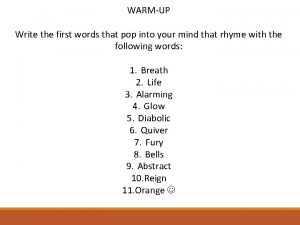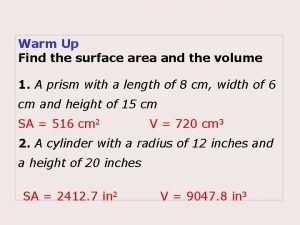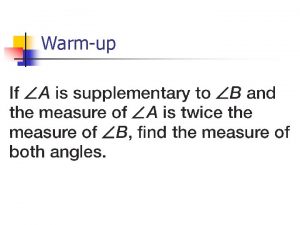Warmup The Falcons have won 80 of their







- Slides: 7

+ Warmup The Falcons have won 80% of their games and leading their division. Assume that the result of each game is independent. They have 9 games left. What is the probability of (a) exactly 6 wins? (b) more than 6 wins? (c) less than 6 wins? d) What is the mean for this binomial distribution?

+ Section 6. 3 Binomial and Geometric Random Variables Learning Objectives After this section, you should be able to… ü DETERMINE whether the conditions for a binomial setting are met ü COMPUTE and INTERPRET probabilities involving binomial random variables ü CALCULATE the mean and standard deviation of a binomial random variable and INTERPRET these values in context ü CALCULATE probabilities involving geometric random variables

Settings Definition: A geometric setting arises when we perform independent trials of the same chance process and record the number of trials until a particular outcome occurs. The four conditions for a geometric setting are B • Binary? The possible outcomes of each trial can be classified as “success” or “failure. ” I • Independent? Trials must be independent; that is, knowing the result of one trial must not have any effect on the result of any other trial. T • Trials? The goal is to count the number of trials until the first success occurs. S • Success? On each trial, the probability p of success must be the same. Binomial and Geometric Random Variables In a binomial setting, the number of trials n is fixed and the binomial random variable X counts the number of successes. In other situations, the goal is to repeat a chance behavior until a success occurs. These situations are called geometric settings. + n Geometric

Random Variable Definition: The number of trials Y that it takes to get a success in a geometric setting is a geometric random variable. The probability distribution of Y is a geometric distribution with parameter p, the probability of a success on any trial. The possible values of Y are 1, 2, 3, …. Note: Like binomial random variables, it is important to be able to distinguish situations in which the geometric distribution does and doesn’t apply! Binomial and Geometric Random Variables In a geometric setting, if we define the random variable Y to be the number of trials needed to get the first success, then Y is called a geometric random variable. The probability distribution of Y is called a geometric distribution. + n Geometric

The Birthday Game + n Example: Read the activity on page 398. The random variable of interest in this game is Y = the number of guesses it takes to correctly identify the birth day of one of your teacher’s friends. What is the probability the first student guesses correctly? The second? Third? What is the probability the kth student guesses corrrectly? Verify that Y is a geometric random variable. B: Success = correct guess, Failure = incorrect guess I: The result of one student’s guess has no effect on the result of any other guess. T: We’re counting the number of guesses up to and including the first correct guess. S: On each trial, the probability of a correct guess is 1/7. Calculate P(Y = 1), P(Y = 2), P(Y = 3), and P(Y = k) Notice the pattern? Geometric Probability If Y has the geometric distribution with probability p of success on each trial, the possible values of Y are 1, 2, 3, …. If k is any one of these values,

Inheriting Blood Type + n Example: Each child of a particular pair of parents has probability 0. 25 of having blood type O. (a) Find the probability that the 3 rd child is the first with type O (b) Find the probability that it takes no more than 2 children to have one with type O (c) Find the probability that it takes more than 4 children to have one with type O

of a Geometric Random Variable If Y is a geometric random variable with probability p of success on each trial, then its mean (expected value) is E(Y) = µY = 1/p. The mean of Y in the Birthday Game example is: Binomial and Geometric Random Variables Mean (Expected Value) of Geometric Random Variable + n Mean













